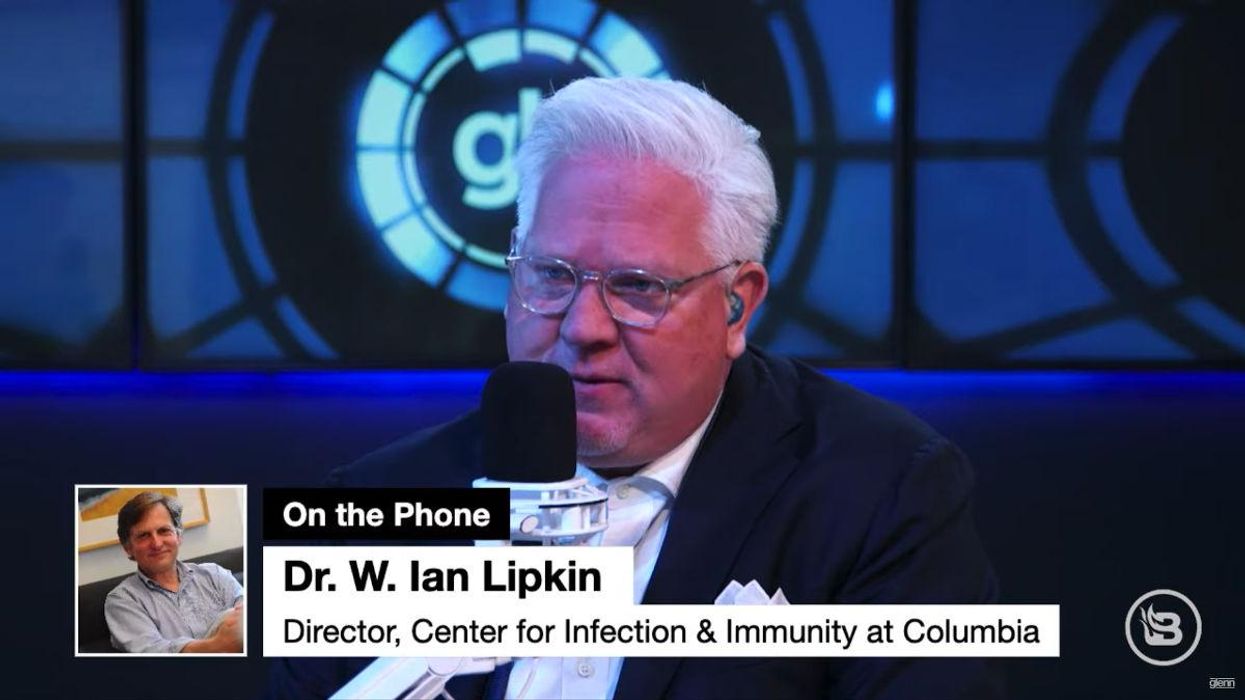
YouTube Screenshot

A Columbia University virologist who believes COVID-19 had natural origins says any investigation into the origins of the virus should be conducted by people who don't have "conflicts of interest."
Dr. Ian Lipkin, a professor of epidemiology at Columbia University, spoke with BlazeTV host Glenn Beck Wednesday about the need for scientific experts to earn the public's trust as they search for the truth about what caused the coronavirus pandemic.
"We don't really understand where this virus came from. We don't know how long it was circulating before we became aware of its presence," he told Beck, adding that there is a need for "transparency in the way investigations are done."
"And they should be done by people who do not have any real or apparent conflicts of interest," Lipkin said. "Now, for example, I would not be the appropriate person to be engaged to go to China and try to figure out whether or not there was something that was going, that was awry. But there are people who have no conflict of interest. And I think they should be engaged to go in and try to figure out what we can know."
Honest and transparent investigations into the origins of the coronavirus pandemic have been obstructed by the Chinese government's propensity to lie and hide relevant data from investigators, as well as intense public criticism and censorship of anyone who voiced opinions or asked questions that contradicted the supposed "scientific consensus" that the virus occurred naturally. Throughout most of 2020, individuals who put forward the hypothesis that the virus was artificially engineered and/or somehow leaked from a laboratory were ostracized and condemned as conspiracy theorists.
Lipkin is a colleague of Peter Daszak, the president of the nonprofit group EcoHealth Alliance and a vehement critic of the lab-leak origins hypothesis, who has become controversial because of his ties to the Wuhan Institute of Virology, the Chinese lab believed by some to have played a role in the origins of the COVID-19 pandemic. Daszak recently made headlines for recusing himself from the Lancet COVID-19 Commission's investigation amid questions of his potential conflicts of interest after it came to light that EcoHealth Alliance provided the Wuhan lab with federal funding from the National Institutes of Health.
Lipkin and Daszak have collaborated on research related to discovering new viruses, predicting and preventing pandemics, and other topics in virology. Lipkin is also the co-author of a highly influential March 2020 study that argued features of the SARS-CoV-2 virus strongly suggested that the virus was "not a laboratory construct or a purposefully manipulated virus." His view, like Dazak's, is that the most likely explanation for how COVID-19 came to be is that the virus started in an animal host, evolved to become transmissible to humans, and was widely transmitted at a Wuhan "wet market" in late 2019, spreading across the globe from there.
He told Beck that there is "no evidence" that the Wuhan lab's chief scientist, Dr. Zhengli Shi, conducted experiments that led to a more transmissible virus. But Lipkin added that there should be international standards for that kind of research, called gain-of-function research, which studies how viruses and bacteria cause infectious disease by artificially manipulating those pathogens.
Lipkin also said there is a growing body of evidence that suggests the virus was outside China as early as October or November 2019, before China reported the first cases of COVID-19.
"Although we became really aware of what was going on in December, in Wuhan, it may have well started earlier, or someplace else," said Lipkin. He added that what scientists know for a fact is that it is risky to work with viral samples "without appropriate bio containment" and that the wildlife markets in China "need to be shut down" because they increase risk of viral outbreak.
Moving forward with an investigation, Lipkin told Beck, scientists need to search for viral samples that precede the Wuhan outbreak, which requires searching laboratories, animals, looking for antibodies in people that would indicate exposure, and thoroughly investigating reports of the virus appearing in places like Milan, Italy, before it was recorded in Wuhan.
Beck pressed Lipkin on the issue of trust, noting that many public health scientists worked to shut down discussion of the lab-leak hypothesis and the mainstream media, motivated by "hatred for Donald Trump," amplified their criticisms.
"There's a lot of politics," Lipkin admitted before adding, "And I have to say that, knowing many of these people as I do, I don't think that it had anything to do with Donald Trump."
"I think they honestly believed, that they're sincere in their belief, that there was no evidence for a lab leak," said Lipkin. "The problem here is that if you're thinking in terms of criminal law, you say you have to prove something, beyond a shadow of a doubt. That's not what we're dealing with here. Because if you make a mistake, everyone's on the hook, right?"